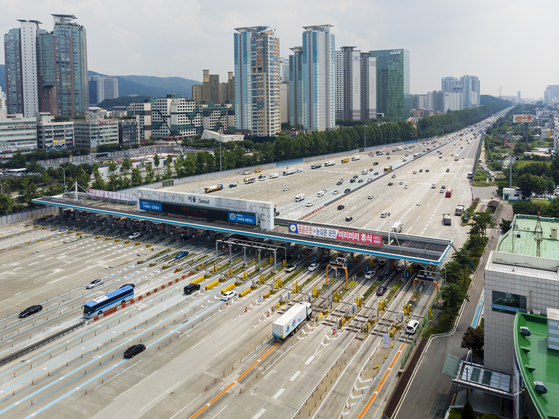
Seoul toll gate on the Gyeongbu Expressway. Korea Expressway Corporation
Gyeongbu Expressway (12,3123 billion won), Government Complex Sejong (821.1 billion won), National Disaster Safety Communication Network (16.1 billion won)… .
This is a list of state-owned (state-owned) properties that appeared in the ‘2020 National Accounting Report’ that the government decided at the State Council on the 6th. They each ranked first in the most expensive state-owned roads, buildings, and goods at the end of last year. The value of the total state-owned property (1156 trillion won) increased by 31.3 trillion won (2.8%) from the previous year. Specifically, land (51.8 trillion won), securities (263 trillion 900 billion won), structures (285 trillion won), and buildings (74 trillion won).
In particular, the value of the highway was overwhelmingly high. In addition to the Gyeongbu Expressway, the West Coast Expressway (6,891.1 billion won) and the Namhae Expressway (6.334 trillion won) topped the list. The Gyeongbu Expressway is the highest since the book value of state-owned property was disclosed. The road value increased compared to the previous year, reflecting the increase in the price of surrounding land and road renovation and repair. The Gyeongbu Expressway alone increased 103.6 billion won from a year ago (12 trillion 2087 billion won).
The building value was rather reduced compared to the previous year. It reflects the’depreciation’ that the value decreases over time. The value of the 1st phase (429.7 billion won) and the 2nd phase (391.4 billion won) of the Government Complex Sejong decreased by 10.3 billion won and 9.1 billion won, respectively, compared to the previous year. The value of the goods increased by 1 trillion won (7.55) from a year ago. The value of property increased due to the Ministry of Public Administration and Security’s disaster safety communication network construction project and the purchase of defense equipment from the Ministry of Defense. Meteorological Administration’s Super Computer Unit 5 (50 billion won), which ranked first last year, was excluded from the ranking, reflecting that it has not completed acquisition.

Top 5 expensive state-owned property. Graphic = Reporter Kim Young-ok [email protected]
The value of state-owned property is published annually by the Minister of Strategy and Finance in a consolidated financial report of central government offices in accordance with the National Accounting Act. It started in 2009 when the government introduced accrual double-entry bookkeeping. In the past’cash-based’ accounting, when cash income or expenditure occurred was recognized as a transaction. However, in’accrualism’, the point at which economic and financial resource fluctuations occur is recognized as a transaction and processed. In addition,’single-entry bookkeeping’ records only the results of income and expenditure, but’double-entry bookkeeping’ is a type of simultaneously recording changes in assets and liabilities, income and expenses when economic transactions and events occur.
SOCs such as roads, railroads and ports are calculated by subtracting the accumulated depreciation from the acquisition cost. If it is difficult to determine the acquisition cost since it is old, the cost to be invested in construction at the present time is calculated, and then the depreciation and depreciation are considered and evaluated. The Board of Audit and Inspection made a problem of not deducting depreciation properly when evaluating state-owned property in 2012.
Some point out whether the value of state-owned property was properly reflected in the evaluation. Looking at the value of the Gyeongbu Expressway alone, it is about half of Korean Air’s assets (25,19 trillion won) as of the end of last year, and similar to Samsung Heavy Industries (12,922.1 trillion won). This is because the’value’ created by the Gyeongbu Expressway was not reflected, but only the real estate price and the value of facilities (concrete, tollgate, etc.) were evaluated.
Of course, the valuation of state-owned property is the net value on the book. In other words, there is no need to charge taxes or buy or sell. An official from the Ministry of Science and Technology said, “We evaluate the value of state-owned property in order to establish a performance-oriented government fiscal operation system and provide high-quality and transparent financial information to information users.” Even if it is sold as a company, the market value will be thoroughly reviewed.”

.
Sejong = Reporter Kihwan Kim [email protected]
![]()
